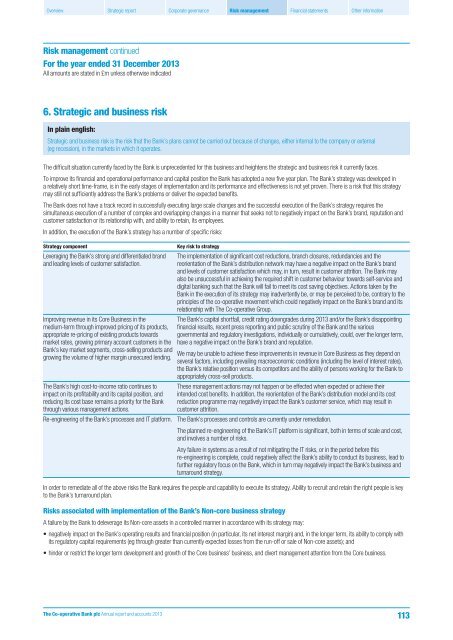bank-r-and-a
bank-r-and-a
bank-r-and-a
Create successful ePaper yourself
Turn your PDF publications into a flip-book with our unique Google optimized e-Paper software.
Overview Strategic report Corporate governance Risk management Financial statements Other information<br />
Risk management continued<br />
For the year ended 31 December 2013<br />
All amounts are stated in £m unless otherwise indicated<br />
6. Strategic <strong>and</strong> business risk<br />
In plain english:<br />
Strategic <strong>and</strong> business risk is the risk that the Bank’s plans cannot be carried out because of changes, either internal to the company or external<br />
(eg recession), in the markets in which it operates.<br />
The difficult situation currently faced by the Bank is unprecedented for this business <strong>and</strong> heightens the strategic <strong>and</strong> business risk it currently faces.<br />
To improve its financial <strong>and</strong> operational performance <strong>and</strong> capital position the Bank has adopted a new five year plan. The Bank’s strategy was developed in<br />
a relatively short time-frame, is in the early stages of implementation <strong>and</strong> its performance <strong>and</strong> effectiveness is not yet proven. There is a risk that this strategy<br />
may still not sufficiently address the Bank’s problems or deliver the expected benefits.<br />
The Bank does not have a track record in successfully executing large scale changes <strong>and</strong> the successful execution of the Bank’s strategy requires the<br />
simultaneous execution of a number of complex <strong>and</strong> overlapping changes in a manner that seeks not to negatively impact on the Bank’s br<strong>and</strong>, reputation <strong>and</strong><br />
customer satisfaction or its relationship with, <strong>and</strong> ability to retain, its employees.<br />
In addition, the execution of the Bank’s strategy has a number of specific risks:<br />
Strategy component<br />
Leveraging the Bank’s strong <strong>and</strong> differentiated br<strong>and</strong><br />
<strong>and</strong> leading levels of customer satisfaction.<br />
Improving revenue in its Core Business in the<br />
medium-term through improved pricing of its products,<br />
appropriate re-pricing of existing products towards<br />
market rates, growing primary account customers in the<br />
Bank’s key market segments, cross-selling products <strong>and</strong><br />
growing the volume of higher margin unsecured lending.<br />
The Bank’s high cost-to-income ratio continues to<br />
impact on its profitability <strong>and</strong> its capital position, <strong>and</strong><br />
reducing its cost base remains a priority for the Bank<br />
through various management actions.<br />
Re-engineering of the Bank’s processes <strong>and</strong> IT platform.<br />
Key risk to strategy<br />
The implementation of significant cost reductions, branch closures, redundancies <strong>and</strong> the<br />
reorientation of the Bank’s distribution network may have a negative impact on the Bank’s br<strong>and</strong><br />
<strong>and</strong> levels of customer satisfaction which may, in turn, result in customer attrition. The Bank may<br />
also be unsuccessful in achieving the required shift in customer behaviour towards self-service <strong>and</strong><br />
digital <strong>bank</strong>ing such that the Bank will fail to meet its cost saving objectives. Actions taken by the<br />
Bank in the execution of its strategy may inadvertently be, or may be perceived to be, contrary to the<br />
principles of the co-operative movement which could negatively impact on the Bank’s br<strong>and</strong> <strong>and</strong> its<br />
relationship with The Co-operative Group.<br />
The Bank’s capital shortfall, credit rating downgrades during 2013 <strong>and</strong>/or the Bank’s disappointing<br />
financial results, recent press reporting <strong>and</strong> public scrutiny of the Bank <strong>and</strong> the various<br />
governmental <strong>and</strong> regulatory investigations, individually or cumulatively, could, over the longer term,<br />
have a negative impact on the Bank’s br<strong>and</strong> <strong>and</strong> reputation.<br />
We may be unable to achieve these improvements in revenue in Core Business as they depend on<br />
several factors, including prevailing macroeconomic conditions (including the level of interest rates),<br />
the Bank’s relative position versus its competitors <strong>and</strong> the ability of persons working for the Bank to<br />
appropriately cross-sell products.<br />
These management actions may not happen or be effected when expected or achieve their<br />
intended cost benefits. In addition, the reorientation of the Bank’s distribution model <strong>and</strong> its cost<br />
reduction programme may negatively impact the Bank’s customer service, which may result in<br />
customer attrition.<br />
The Bank’s processes <strong>and</strong> controls are currently under remediation.<br />
The planned re-engineering of the Bank’s IT platform is significant, both in terms of scale <strong>and</strong> cost,<br />
<strong>and</strong> involves a number of risks.<br />
Any failure in systems as a result of not mitigating the IT risks, or in the period before this<br />
re-engineering is complete, could negatively affect the Bank’s ability to conduct its business, lead to<br />
further regulatory focus on the Bank, which in turn may negatively impact the Bank’s business <strong>and</strong><br />
turnaround strategy.<br />
In order to remediate all of the above risks the Bank requires the people <strong>and</strong> capability to execute its strategy. Ability to recruit <strong>and</strong> retain the right people is key<br />
to the Bank’s turnaround plan.<br />
Risks associated with implementation of the Bank’s Non-core business strategy<br />
A failure by the Bank to deleverage its Non-core assets in a controlled manner in accordance with its strategy may:<br />
• negatively impact on the Bank’s operating results <strong>and</strong> financial position (in particular, its net interest margin) <strong>and</strong>, in the longer term, its ability to comply with<br />
its regulatory capital requirements (eg through greater than currently expected losses from the run-off or sale of Non-core assets); <strong>and</strong><br />
• hinder or restrict the longer term development <strong>and</strong> growth of the Core business’ business, <strong>and</strong> divert management attention from the Core business.<br />
The Co-operative Bank plc Annual report <strong>and</strong> accounts 2013<br />
113


